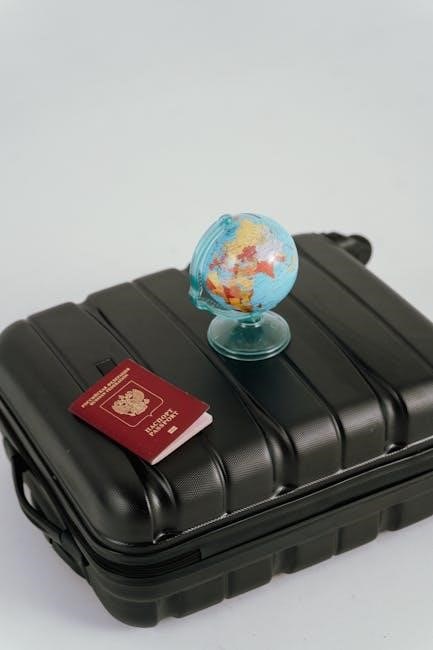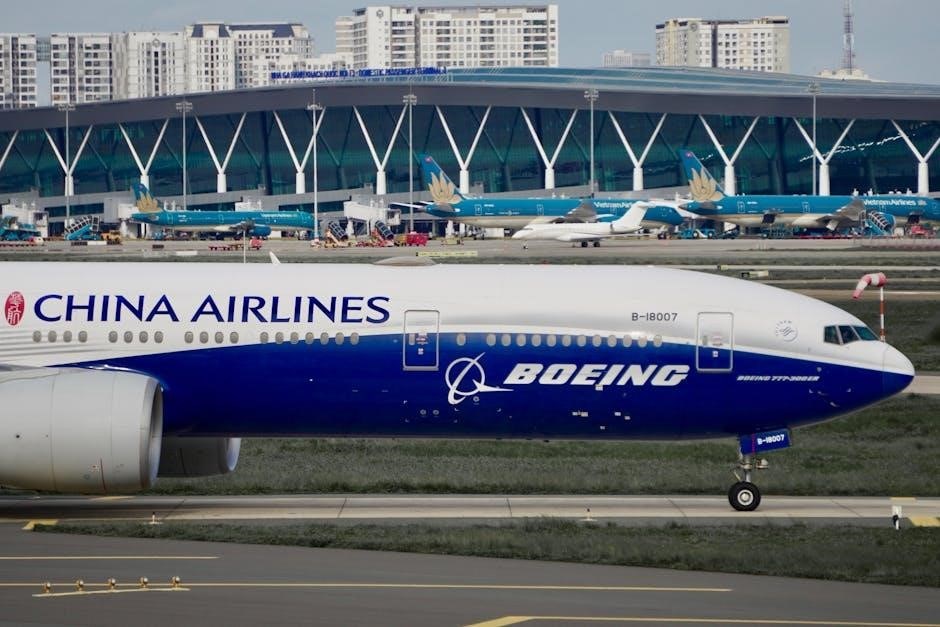The NCAA International Guide serves as a pathway for global student-athletes to navigate U.S. college athletics. It provides critical resources to ensure eligibility‚ success‚ and compliance with NCAA standards.
Overview of the NCAA and Its Role in College Athletics
The National Collegiate Athletic Association (NCAA) is a premier governing body for college athletics in the U.S.‚ overseeing competitions‚ rules‚ and eligibility standards. It represents over 1‚200 institutions across three divisions (I‚ II‚ and III)‚ ensuring fair play and academic integrity. The NCAA’s primary role is to provide opportunities for student-athletes to excel in sports while maintaining a balance between athletics and education. Its framework promotes amateurism‚ ensuring athletes compete without undue influence or compensation. By setting academic and eligibility standards‚ the NCAA safeguards the integrity of college athletics‚ fostering a system where student-athletes can grow both on and off the field.
Importance of the NCAA International Guide for Global Student-Athletes
The NCAA International Guide is a vital resource for global student-athletes seeking to compete in U.S. colleges. It provides clear guidelines on eligibility‚ academic requirements‚ and amateurism standards‚ helping international students navigate the complexities of NCAA regulations. The guide ensures that students from diverse educational backgrounds can meet the necessary criteria for participation. By offering specific criteria and equivalencies‚ it levels the playing field for international applicants. This resource is essential for students aiming to balance athletics and academics in the U.S.‚ making their transition smoother and more successful. It acts as a bridge between global education systems and NCAA expectations‚ ensuring compliance and paving the way for student-athletes to thrive.

NCAA Eligibility Requirements for International Students
NCAA eligibility for international students requires meeting specific academic and amateurism standards‚ ensuring they align with U.S. educational and athletic regulations.
Academic Eligibility Standards
International students must meet NCAA academic eligibility standards to compete in college athletics. Core courses‚ including English‚ math‚ and science‚ must be completed with a minimum GPA. Standardized test scores‚ such as SAT or ACT‚ are also required for eligibility. The NCAA Eligibility Center reviews transcripts to ensure they meet U.S. academic equivalency standards. International students should complete 16 core courses‚ with 10 completed by the end of sophomore year. Early certification is recommended to avoid delays. The NCAA provides guidelines for international academic equivalencies‚ ensuring fairness and consistency. Meeting these standards is crucial for student-athletes to qualify for NCAA participation and maintain eligibility throughout their college career.
Amateurism Certification Process
The NCAA Amateurism Certification ensures student-athletes maintain amateur status‚ free from improper benefits or compensation. International students must complete a certification questionnaire and submit required documents. The NCAA Eligibility Center reviews submissions to verify compliance with amateurism rules. This process ensures fair competition and maintains the integrity of college athletics. International athletes must disclose any involvement in professional leagues or compensation for sports participation. Failure to comply may result in eligibility issues. The certification is a critical step for international students to qualify for NCAA participation and must be completed before starting college athletics. Understanding and adhering to these guidelines is essential for a smooth transition into U.S. college sports.

Understanding the NCAA Recruitment Process
The NCAA recruitment process guides international athletes through steps to connect with coaches‚ communicate effectively‚ and ensure eligibility‚ streamlining their path to U.S. college sports participation.

Steps for International Students to Get Noticed by NCAA Coaches
International students can increase their visibility by creating highlight reels showcasing their athletic skills and sharing them with coaches. Reaching out via email or social media with personalized messages and updated athletic resumes is crucial. Attending camps or combines in the U.S. or internationally provides exposure. Building a strong online presence through platforms like YouTube or Instagram helps coaches assess talent remotely. Networking with current college athletes or mentors can also facilitate connections. Proactively researching colleges and their programs ensures a targeted approach. Consistent communication and persistence in following up with coaches are key to standing out in the recruitment process.
Communication Strategies with College Representatives
Effective communication is vital for international students to connect with NCAA college representatives. Start by crafting clear‚ concise messages that highlight your academic and athletic achievements. Personalize emails to coaches‚ addressing them by name and referencing the specific program. Use proper etiquette‚ such as formal greetings and polite language‚ to make a strong first impression. Prepare a list of thoughtful questions to ask during interactions‚ demonstrating genuine interest in the college and its athletic program. Utilize professional platforms like email or the college’s official portal for communication. Follow up promptly after initial contact to express continued interest. Additionally‚ engage in video calls or virtual meetings to showcase your personality and communication skills. honest and transparent dialogue fosters trust and strengthens your relationship with college representatives.

Navigating Academic Preparation for NCAA Eligibility
Navigating academic preparation involves meeting core course requirements‚ calculating GPA from international transcripts‚ and understanding the role of standardized tests like SAT/ACT for eligibility.
Core Course Requirements and Equivalencies

International students must complete 16 core courses in high school‚ including English‚ math‚ science‚ and social science. Courses must be comparable to U.S. standards. The NCAA Eligibility Center evaluates transcripts to ensure they meet these requirements. For students outside the U.S.‚ course equivalencies are determined based on local curriculum standards. Grades are converted to a U.S. GPA scale for eligibility purposes. It’s crucial to work with school counselors to verify that courses align with NCAA expectations. Understanding equivalencies helps students avoid delays in the eligibility process. Proper planning ensures international athletes meet academic standards for NCAA participation.
Calculating GPA for International Transcripts
The NCAA Eligibility Center converts international students’ grades to a U.S. GPA scale to ensure fairness and consistency. Official transcripts are required for accurate conversion. Different grading systems worldwide mean the process varies. Students must submit detailed records‚ including grade conversions or syllabi if needed. Early submission is recommended to avoid delays. Understanding how your country’s grading system aligns with U.S. standards is crucial. The NCAA provides guidelines to help international athletes navigate this process. Working closely with your school counselor can ensure proper documentation. Ensuring accurate GPA conversion is key to meeting eligibility requirements. Start early to avoid complications and verify all documents meet NCAA standards for a smooth transition to U.S. college athletics;
Role of Standardized Tests (SAT/ACT)
Standardized tests like the SAT or ACT play a critical role in determining NCAA eligibility for international student-athletes. These exams provide a standardized measure of academic readiness for U.S. colleges. International students must submit official SAT or ACT scores directly to the NCAA Eligibility Center. The scores are evaluated alongside the student’s GPA to determine academic eligibility. Different NCAA divisions may have varying score requirements‚ so it’s essential to check specific guidelines. Preparing thoroughly for these tests is crucial‚ as high scores can enhance eligibility and scholarship opportunities. Understanding the scoring system and test format helps international students perform their best. Submitting scores early ensures timely processing of your application. Proper preparation and understanding of these tests are vital for meeting NCAA academic standards.

The NCAA Application Process for International Athletes
The NCAA application process for international athletes involves submitting transcripts‚ test scores‚ and completing eligibility requirements. It ensures compliance with academic and amateurism standards for U.S. college athletics.
Step-by-Step Guide to Submitting Your Application
International athletes must follow a structured process to submit their NCAA application. First‚ create an account on the NCAA Eligibility Center website. Next‚ complete the amateurism certification and submit required academic documents‚ including official transcripts and proof of graduation. Standardized test scores‚ such as SAT or ACT‚ must also be sent directly from the testing agency. Ensure all materials are translated into English and verified by the appropriate authorities. Pay the application fee and review your profile for accuracy; Finally‚ track your application status through the NCAA portal. Timely submission and adherence to deadlines are crucial for a smooth process. This guide ensures compliance with NCAA requirements‚ facilitating a successful transition to U.S. college athletics.
Required Documentation for International Applicants
International student-athletes must submit specific documents to the NCAA Eligibility Center. This includes official academic transcripts‚ proof of high school graduation‚ and standardized test scores (SAT or ACT). Transcripts must be translated into English and verified by the appropriate authorities. Amateurism certification is also mandatory‚ requiring completion of an online questionnaire. Additional documentation may include proof of citizenship or visa status. All materials must be submitted directly by the issuing institution or testing agency to ensure authenticity. The NCAA may request further verification if discrepancies are found. Timely submission of all required documents is essential to avoid delays in the eligibility review process. Ensuring accuracy and completeness of these materials is critical for international applicants seeking NCAA eligibility. Proper preparation prevents unnecessary complications and supports a smooth transition to U.S. college athletics.
The NCAA International Guide is a vital resource for global student-athletes‚ providing clear pathways to U.S. college opportunities while ensuring compliance with eligibility standards.
Final Tips for Success in the NCAA Application Process
To ensure a smooth transition‚ stay organized and proactive throughout the NCAA application process. Begin by thoroughly understanding eligibility requirements and gathering all necessary documents early. Communicate regularly with college coaches and admissions officers to clarify expectations and demonstrate your commitment. Utilize the NCAA Eligibility Center resources to track your progress and address any issues promptly. Additionally‚ seek guidance from mentors or counselors familiar with the process. Finally‚ remain patient and persistent‚ as navigating the NCAA system can be complex but rewarding for international student-athletes.

Leave a Reply
You must be logged in to post a comment.